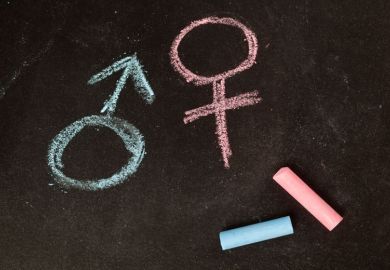As a young academic, I can say with a certain level of confidence that my gender will stifle my career progression.
Most probably, I will become just another droplet leaking out of the academic pipeline.
Although as a culture we value separating our private and professional lives, the #MeToo phenomenon forces us to think about sexual politics in the workplace, especially in workplaces where power is concentrated in the hands of the few, and gender disparities are obvious (such as in academia).
While this may be easier for women to understand, our gender identities are central in determining our fates, especially when it comes to making a name for yourself in the professional arena.
Putting it as Virginia Woolf’s time-travelling (and bigender) Orlando would, the world is carefully constructed by men for men, and it all starts from the roles that we wear.
Women are somewhat tormented by social dichotomies. As nicely exemplified in Naomi Wolf’s Promiscuities, women coming of age in Western societies often find themselves facing the Madonna-whore complex. This paradox, coined by Freud to describe a male sexual disorder, is now a term often used to describe the conflicting gender-related expectations that our society has of women.
According to this concept, the sexual and power identities available to young women today are polarised into two figures: the overpowering and dangerous female (the prostitute) or an all-loving and selfless “wifey” (the virgin).
Sex and power go hand in hand, as sexual harassment in the workplace teaches us, and this paradox works with us (or against us) when dealing with female colleagues.
Being a third-wave feminist (I admit it), during my career infancy, I believed that I could steer clear of setbacks by avoiding “the Man” professionally and choosing female mentors and supervisors. Naively, I applied the rules of the sisterhood to the workplace, and believed that if there was an “old boys’ network”, surely an “old women’s circle” was hiding somewhere in the corridors (or tea parlours?) of universities.
Surely, three generations of emancipated women in academia would have created some level of awareness among women to allow an influential network of solidarity to form.
Not so shockingly for some of you, I suppose, the “old women’s network” does not exist – and I should be very wary of calling any senior female academic an old woman.
There is very little room to share and discuss common problems (except very few grassroots examples like #wiasn) and I can’t really find many resources for gender-specific professional issues.
How did the very few women who are at the top of the academic tower get there? We all agree that support networks are the answer but which networks did these women have (besides their families), and are these available to women starting an academic career now?
Even more worryingly, I found the Madonna-whore complex to be alive and flourishing.
Not only are women in power usually disliked (Hillary Clinton?) but there appears to be more competition between women in the workplace as well. Rivalry is obviously not gendered but these stories may point to what is actually happening to women trying to make it to the top.
The Madonna-whore complex is still with us and widely determining the fates of individual women.
After decades of feminisms and policymaking, women still have surprisingly little access to role models and support that could allow them to creatively overcome such a paralysing complex.
We are stuck with social identities that do not let us grasp and keep professional power and influence, and we (women) are firstly responsible for this.
Yes, things are changing – but slowly and with discernible and systematic setbacks.
We need to hear more stories of how successful female academics managed to balance their families and work lives, or how they persuaded the right people to judge them for their merits and not their outfit.
To fix gender inequality, we need to be provided with female role models to “imitate”.
Our idea of power needs to be rethought to include more feminine qualities.
Women should not feel ashamed or victimised if there is a disadvantage (or even deny it, because it is a statistical fact).
More importantly, we should acknowledge and discuss, and challenge our stereotypes of power and what it should look like.
To our surprise, we may find out that what is limiting us is actually a superpower.
Elisabeth Julie Vargo is a research consultant.
Register to continue
Why register?
- Registration is free and only takes a moment
- Once registered, you can read 3 articles a month
- Sign up for our newsletter
Subscribe
Or subscribe for unlimited access to:
- Unlimited access to news, views, insights & reviews
- Digital editions
- Digital access to THE’s university and college rankings analysis
Already registered or a current subscriber?








